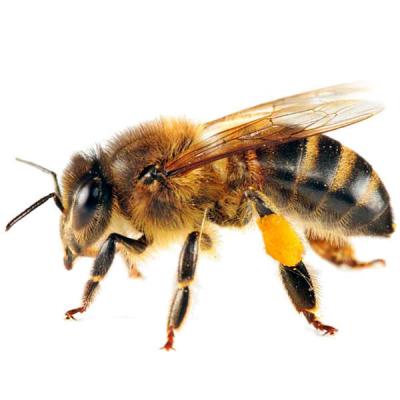Bee Control
Generally bees are not as aggressive as wasps or hornets and it is rarer to be stung by a bee. They only tend to sting if they feel in danger or if their hive is being threatened.
Remember, it can be illegal to destroy a bee nest using insecticides because there are no insecticides cleared for use against bees
How to identify a bee problem
If you have a bees nest you will probably see them entering a hole in the ground, wall or roof.
Where they nest often depends on the species. It may not be necessary, or legal, to destroy the nest - especially if it belongs to honey bees. We will be able to help you identify the types of bees you have - usually bumble bees, honey bees or a wild species such as masonry or mining bees.
To learn more about the different types of bee we have in the UK, look at this blog written by Clive on the DIY Garden. Click here to read the blog.
Why we don't treat bees!
There are around 250 types of bee in the UK, including 25 bumblebees and one type of honeybee. It is important to remember that bees are beneficial and vital insects, which are not normally considered as pests.
Many species of bee are considered ‘endangered’. Bees are very important pollinators – they actually pollinate about a third of everything we eat. Although many bee species have stings, they will only sting people if strongly provoked and, because they are so beneficial, every effort should be made to avoid controlling or destroying them.
In the spring we begin to see many UK bee species becoming more active. This increase in activity can cause unnecessary confusion and concern for some people. Honeybees are frequently mistaken for wasps. However, wasps don’t become active until early summer, so if you see a buzzing insect in the spring it will be a honeybee, not a wasp.
Honeybees usually exist within hives, in the care of beekeepers. But there are feral honeybee colonies living in the wild. As summer approaches, honeybee swarms are likely to occur. Swarming is the honey bee’s natural reproductive behaviour, so if you see a large group of bees hanging from a branch or in a cluster on the ground it is best to contact the British Beekeepers Association to find a local swarm collector.
Bumble bees may look and sound menacing, but they rarely display aggressive behaviour and just want to get on with their own business. This is true of a number of solitary bee species. They all play a vital role in nature. In many cases, their activity should be encouraged to continue without interruption. If they are being a nuisance, then it is best to leave them to it, although it may be possible to ‘move’ them to a more convenient location. Call us for advice.
Since it is vital to try to protect all bee species, Cleankill wishes to encourage responsible pest management within our industry.
- We try to educate customers on the benefits of bees as pollinators, their behaviour and their lifecycle.
- We encourage customers to consider the alternatives to destruction.
- We always advise contact with the British Beekeepers’ Association when people encounter honeybee swarms – or request that solitary and bumblebee colonies are allowed to complete their activities without interference.
Our Service Director, Clive Bury, is an active beekeeper. To learn more about his hobby, read his blog. You can see a video of his bees below.
If you have been stung by a bee, this NHS choices web page contains information on how best to treat insect stings.
